
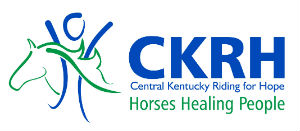
Central Kentucky Riding for Hope, Inc. (CKRH)
4185 Walt Robertson Rd/ KY Horse Park
LEXINGTON, KY 40511
Mailing Address:
P O Box 13155
LEXINGTON, KY 40583
Phone: 859-231-7066
MAKE AN INQUIRY
View our WEBSITE
EIN: 31-1024505Founded: 1981
View our PHOTO GALLERY
Profile Last Updated September 8, 2025Public Charity
Click here to view listing(s) of the program horses we are seeking
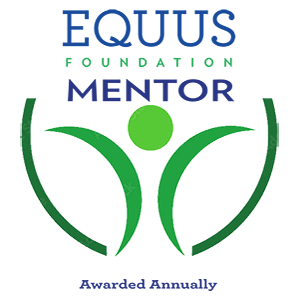
The Mentor Accreditation is awarded annually to an organization that operates at the highest standards for business and equine welfare practices in accordance with EQUUS Foundation guidelines for business and equine welfare practices outlined here.
We welcome you to donate directly to Central Kentucky Riding for Hope, Inc. (CKRH); Central Kentucky Riding for Hope, Inc. (CKRH) will receive 100% of your donation made here. However, before making a donation, we encourage you to review this organization's Mentor information.
Last Updated: May 31, 2025

MISSION & PROGRAMS
Mission:Central Kentucky Riding for Hope (CKRH) is dedicated to enriching the community by improving the quality of life and health of individuals with special physical, cognitive, emotional or social needs through therapeutic activities with the horse.
Our organization conducts Equine Assisted Services in accordance with the EQUUS Foundation Guidelines on Qualifications of Organizations Conducting Equine Assisted Services (EAS).
Our organization provides outreach and/or public education programs involving horses.
100% of our total programs and services are equine-related.
Our organization is directly responsible for the care and shelter of equines involved in our programs.
Our organization does not CURRENTLY use satellite, overflow, foster, and/or outreach facilities.
Please describe what steps your organization takes to ensure that:
1) all interactions between your equines and people are mutually beneficial and conducted in accordance with the Guidelines for Human-Equine Interactions stated below;
2) all equines in the care of our organization and/or equines that participate in the organization's program have access to clean drinking water at all times; nutritious food in sufficient quantity, including natural forage such as pasture grass and/or hay; appropriate veterinary, farrier, and dental care; shelter and protection from the weather; sufficient safe space to move around comfortably on a daily basis; and daily opportunity to freely interact and have contact with other equines:
Central Kentucky Riding for Hope is dedicated to ensuring that interactions between our equine therapy partners and participants are mutually beneficial and that all equines in our program receive pristine care and treatment. Our PATH Intl. Certified Therapeutic Riding Instructors tailor lesson plans to the specific needs, abilities, and temperaments of each participant and horse, ensuring that every interaction supports the well-being of both. These interactions are closely monitored by instructors and specially trained volunteers to ensure safety and comfort. If a horse displays signs of stress or discomfort, immediate adjustments, such as removing the horse from the activity, are made. Following such an adjustment, equine and program staff meet to discuss the event and determine if the equine is better suited for other activities, should not participate in the activity which induced stress, needs further exposure and training, or a break from activities.
A key aspect of CKRH’s success lies in our individualized pairing process. Each horse is matched with participants based on weight limits, personality traits, workload balance, and the participant’s skill level. This ensures that horses accommodate participants’ current needs while fostering growth and skill advancement. Pairings are flexible as participants may work with multiple horses over time to develop a broader range of skills. Staff also regularly work with horses both in and outside of the arena to maintain their physical fitness, mental health, and readiness for therapeutic activities.
CKRH equine staff assess the health and well-being of all program horses twice daily. Our horses have access to clean water at all times, and every paddock contains an automated heated waterer or a standard 100-gallon rubber trough. For horses requiring stall rest, two 5-gallon buckets are used and cleaned regularly. CKRH’s equine therapists receive a balanced diet of natural forage, grain, and hay, with monthly weight and nutritional checks conducted by McCauley’s Feeds nutritionists. Horses are fed alfalfa hay (sparingly) and orchard grass twice daily, approximately 10 hours apart. Hoof health is managed by CKRH's farriers, Bluegrass Horseshoeing School, Josh Yaber, and Josie Bortz every 6-8 weeks. Podiatry services are provided by Dr. Cage Cruise (Bluegrass Equine Podiatry) on a case-by-case basis if any signs of navicular, laminitis, or general lameness appear. Routine veterinary care, vaccinations, and dental maintenance are provided by Hagyard Equine Medical Institute and Rood & Riddle Equine Hospital. Our 40-acre facility features 13 spacious paddocks and 10 run-in sheds, allowing horses to socialize, exercise, and find shelter, promoting both physical and emotional wellness.
Equine Assisted Services (EAS):
Our organization provides the following Equine Assisted Services (EAS):
Adaptive/Therapeutic Riding
Adaptive/Therapeutic Unmounted Horsemanship
Equine-assisted Learning in Education
4: Total number of Equine Assisted Service Providers at Central Kentucky Riding for Hope, Inc.
1 Fayette County Public Schools
FACILITY PARTICIPATION:
Central Kentucky Riding for Hope, Inc.
RELATIONSHIP: Independent Contractor
SERVICES PROVIDED:
Equine-assisted Learning in Education
DEGREES, LICENSES AND/OR CERTIFICATIONS
DEGREES, LICENSES AND/OR CERTIFICATIONS - Students approved by the school system attend The STABLES, an Alternate Education Program defined by Kentucky state regulations 704 KAR 19:002 as an community partnership providing a unique learning opportunity for students in grades 8-12 who thrive in a nontraditional school setting.
2 Melissa Walters, CTRI, COTA/L
FACILITY PARTICIPATION:
Central Kentucky Riding for Hope, Inc.
RELATIONSHIP: Employee
SERVICES PROVIDED:
Adaptive/Therapeutic Riding
Adaptive/Therapeutic Unmounted Horsemanship
DEGREES, LICENSES AND/OR CERTIFICATIONS
Melissa is CKRH's Program Manager and a PATH Certified Therapeutic Riding Instructor. Walters is also a Licensed Certified Occupational Therapy Assistant.
3 Nancy Delacenserie
FACILITY PARTICIPATION:
Central Kentucky Riding for Hope, Inc.
RELATIONSHIP: Employee
SERVICES PROVIDED:
Adaptive/Therapeutic Riding
Adaptive/Therapeutic Unmounted Horsemanship
DEGREES, LICENSES AND/OR CERTIFICATIONS
Nancy is a part-time therapeutic riding instructor at CKRH. She holds a PATH Certification (CTRI.)
4 Phoenix Franzman, CTRI
FACILITY PARTICIPATION:
Central Kentucky Riding for Hope, Inc.
RELATIONSHIP: Employee
SERVICES PROVIDED:
Adaptive/Therapeutic Riding
Adaptive/Therapeutic Unmounted Horsemanship
DEGREES, LICENSES AND/OR CERTIFICATIONS
Phoenix is CKRH's Lead Instructor and PATH Certified Therapeutic Riding Instructor.
Overview of our programs involved with providing EAS to individuals with special needs:
Central Kentucky Riding for Hope (CKRH)'s mission is to enrich the community by improving the quality of life and health of individuals with special physical, cognitive or behavioral needs through equine-assisted activities & therapies. A Premier Accredited Center of PATH since 1998, CKRH provides direct services to more than 300 individuals each year with the support of 30 (avg. herd #) equine partners, 125 weekly volunteers, and a dedicated staff of certified instructors, licensed therapists, equine facility managers, and administrative personnel.
All core CKRH programming is developed and facilitated by a PATH Certified Therapeutic Riding Instructor with input from participants, their families, referring medical practitioners, educators, and CKRH’s Program Director. A customized lesson plan is developed for each participant or community group based on the following needs:
Physical/Cognitive/Developmental Disabilities - for mild to severe medical conditions such as autism, cerebral palsy, Down syndrome, multiple sclerosis, or stroke. Therapeutic Riding & Horsemanship, CKRH’s flagship service, are year-round mounted & unmounted activities designed to improve motor skills, strength, balance, and cognitive processing. Specialty programs include HorseAbililty, a summer camp collaboration with Easterseals Bluegrass and Minis and Me, a non-mounted program designed to progress horsemanship skills on the ground while improving the participant’s self-esteem and confidence, problem-solving, sequencing, and gross and fine motor skills
Mental Health - for emotional, social, or behavioral conditions. Mounted & unmounted activities are designed to improve emotional awareness & regulation as well as help reduce stress or anxiety. Specialty programs include Adjust Fire (for active-duty and veteran soldiers with combat injuries or resiliency issues such as PTSD); and an emotional regulation course that takes place in conjunction with FMC, the women's prison.
Learning Disabilities – for academic or vocational challenges. Unmounted activities are designed to improve core educational subjects (i.e. reading, spelling, math) and tangential skills such as organizing, sequencing, and memory retention. Specialty programs include the STABLES (a year-round curriculum of Fayette County Public Schools for 50+ students in grades 8-12).
We currently have seven retired registered Thoroughbreds who have been retrained to provide unmounted therapeutic activities. They are mostly used for programming with veterans and at-risk youth. Our staff has made a great effort to select and train horses that fit our high-quality programming and abide by the standards set by the Professional Association of Therapeutic Horsemanship International (PATH).
Outreach and/or Public Education:
CKRH's programs are designed not only to provide equine-assisted therapeutic services but also to engage the community through outreach and public education.
We regularly host volunteer groups throughout the year, offering hands-on opportunities for individuals and organizations to learn about our mission while supporting our facility, horses, and programs. These volunteer activities often involve barn and property maintenance, horse care, and preparing for events, providing participants with a rewarding and educational experience that highlights the transformative power of equine-assisted services.
CKRH also actively participates in outreach, marketing, and tabling events throughout the community. Our beloved miniature horses are a cornerstone of these efforts, as they serve as unique and engaging ambassadors for CKRH’s mission. By bringing our minis to schools, community fairs, and events, we aim to educate the public about equine-assisted services, raise awareness about our programs, and inspire involvement. These events allow us to connect with potential volunteers, donors, interns, and program participants, fostering relationships that strengthen our ability to serve individuals with physical, cognitive, emotional, and behavioral needs.
Research/Medical Use of Equines:
Our organization has never made, and would not ever consider making, equines available for research studies or medical training that involves invasive procedures and/or that which may cause pain or suffering to the equine.
Religious Affiliation:
Our organization does not promote religious education, religious purposes, or a specific religious faith or use donations for religious education or religious purposes; require participants to be of a certain faith; require participation in religious, instruction, activities or services; or require participation in prayer, worship, religious instruction or other religious activities as a condition of receiving social or secular services offered.
Auction Donation:
Our organization has never allowed, or would not consider allowing, an equine to be sold, transferred, released, or otherwise placed into possession of any person or organization that would cause or allow the equine to be sold at auction for slaughter.
POLICIES: INTAKE, ASSESSMENT & TRAINING
Prior to a horse being accepted and/or arriving at the facility, the organization has the following policies in place:The owner of a potential equine is interviewed over the phone or in person prior to seeing the equine
The equine is evaluated at its place of residence
The owner completes an application/contract which constitutes the agreement between the owner and our organization when the equine is acquired from the equine's owner other than by seizure or by abandonment
The owner is financially responsible for the shipping of the equine to and from the organization
If health records are not available or are out-of-date, our veterinarian will administer appropriate vaccinations
A health certificate signed by a veterinarian and dated no more than seven days prior to arrival is provided to our organization either prior to or upon arrival of the equine attesting to the health status of the equine
Trial Period: Check all that apply:
Equines are on trial for 60 or more days
During the trial period, the organization accepts financial responsibility for the care of the equine, including board, feed, shoeing and any necessary veterinary care, up to a fixed amount agreed upon by the organization and the owner
The trial period may be terminated by either the organization or the owner for any reason
Equines are on trial for up to 30 days
Equines are on trial up to 60 days
The trial period may be reduced based on the equine's progress
During the trial period, the organization accepts total financial responsibility for the care of the equine, including board, feed, shoeing and any necessary veterinary care
During the trial period, the owner/donor is financially responsible for the care of the equine, including board, feed, shoeing and any necessary veterinary care
Upon intake, the organization has the following quarantine policy in place:
The equine is confined to a designated and separate area for isolation and quarantine at the facility for a prescribed period of time
The equine is confined to a designated and separate area for isolation and quarantine off-site for a prescribed period of time
The equine is not quarantined
The typical length of quarantine is: 20 to 30 days
Following arrival of the equine at the facility, the following is performed:
Physical examination to include temperature, pulse and respiration by a trained staff member upon arrival
A Henneke Body Conditioning Score or other body conditioning score is assigned by a trained staff member upon arrival
Photographs are taken of each equine upon arrival at the facility and kept with the equine's health records
Physical examination by a farrier
Physical examination to include temperature, pulse and respiration by a veterinarian upon arrival
A Henneke Body Conditioning Score or other body conditioning score is assigned by a veterinarian upon arrival
Physical examination by a dentist
The equine is microchipped if the equine has not been microchipped
Horses are assessed for following skills and behaviors:
Retrieval from a pasture/paddock
Leading with a halter and lead rope
Temperament, disposition and attitude, such as rated from very calm to very high spirited
Saddling
Bridling
Lunging
Loading onto and unloading off a trailer
Mounting and dismounting
Riding at the walk
Riding at the trot
Riding at the canter
Riding by a beginner and/or unbalanced rider
Tolerance to unusual objects and loud noises
Known vices, i.e., cribbing, biting, kicking, weaving, stall walking, etc
Grooming
Bathing
Clipping
Tolerance to multiple handlers at the same time
Jumping
Driving (Pulling a carriage)
Our organization has the following policies and procedures in place pertaining to the ongoing assessment of horses in its care:
Physical examination by a veterinarian at least annually
The Henneke Body Condition score or other body conditioning score is updated at least annually by the veterinarian
Vaccinations are administered at least annually
Photographs are taken of each equine annually and kept with the equine's health records
Equines at our facility may be treated by an equine chiropractor
Equines at our facility may be treated by an equine acupuncturist
Equines at our facility may be treated by an equine massage therapist
Equines at our facility may be treated by an equine nutritionist
The Henneke Body Condition score or other body conditioning score is updated at least annually by a trained staff member
Photographs are taken of each equine monthly and kept with the equine's health records
Our organization has the following policies and procedures in place pertaining to the weight-carrying or workload capabilities of horses/equines that are ridden in our care:
Our organization evaluates the weight-carrying and workload limitations for each equine that is ridden at least annually
Our organization maintains a written record of the weight-carrying and workload limitations for each equine that is ridden
Our organization does not evaluate the weight-carrying and workload limitations for each equine that is ridden
No equines are ridden; not applicable
The following variables are considered in determining the weight-carrying and workload limitations for each equine that is ridden:
Equine age, weight, breed, body condition, fitness, balance, health and soundness
Equine conformation to include the top line, length of back, strength and width of loin, bone density (measured by the circumference of the cannon bone just below the knee)
Size, shape, condition and angle of the hooves
Participant weight, height, body proportions, balance, fitness and riding skills as well as behavioral issues and safety concerns
Weight and proper fit of the saddle and other equipment
Terrain and footing in the working environment
Duration and frequency of working sessions, as the frequency with which an equine is subjected to maximum weight carrying and/or workload
Nature and pace of work, repetitive or varied, radius of turns, degree of incline and regularity of footing when equine is subject to maximum weight-carrying capacity
Temperature and/or weather conditions
Seasonal impact on the equines' workload and weight-carrying capabilities and limitations
Our organization does not evaluate the weight-carrying and workload limitations for each equine that is ridden
No equines are ridden; not applicable
Horses provided formal training (groundwork or riding): Weekly
POLICIES: BREEDING
The organization has the following policies related to breeding and stallions:Our organization does not conduct breeding of equines owned or under the care of our organization.
Our main facility where our organization conducts its programs does NOT breed equines.
One or more of the facilities where our organization conducts its programs, including foster/temporary care facilities, breeds equines
One or more of the facilities where our organization conducts its programs, including foster/temporary care facilities, are permitted to house stallions
POLICIES: EUTHANASIA
The organization has the following policies related to euthanasia:Our organization will never have an equine euthanized for space
Our organization will have an equine euthanized upon the recommendation of the veterinarian if the equine is a threat to itself, other equines, or people
Our organization will have an equine euthanized upon the recommendation of the veterinarian after all reasonable treatment options have been explored
Euthanasia is done on site when possible to decrease trauma from transport
Disposal of the carcass is handled within 24 hours
Our organization will never have an equine euthanized under any circumstances
Euthanasia is done at the veterinarian's facility
The following are authorized to administer the procedure for your organization in accordance with state laws:
Veterinarian
A certified euthanasia technician
Senior staff with appropriate training
Employee of animal control shelter or humane society with appropriate training
Veterinary student under the supervision of a licensed veterinarian
Not applicable. Our organization prohibits euthanasia under any circumstances
Additional information about our euthanasia policies and practices:
CKRH follows euthanasia policies as established by the American Association of Equine Practitioners (AAEP.)
POLICIES: RE-HOMING
View Re-homing AgreementOur organization has the following re-homing (adoption/purchase) policies and procedures in place:
All potential adopters/purchasers complete a written contract which constitutes the agreement between our organization and the new owner
Our organization does NOT re-home an equine to first time equine owners
Our organization will only re-home an equine to a location where another equine resides
The distance of a potential adopter/purchaser's home from our facility is a consideration for when re-homing an equine
Our organization conducts a site visit of the adopter/purchaser's facility before the transfer of the equine to the adopter/purchaser's facility
Potential adopters/purchasers must visit our organization and be observed with the equine on site
Potential adopters/purchasers are encouraged to do a short-term, on-site foster with the equine
Adopters/purchasers are NOT required to provide updates
Our organization has the following policies and procedures related to horses that need to be retired, are no longer able to contribute to the mission of the organization, and/or are no longer manageable:
Equines may remain at our organization for their lifetimes
Equines may be found suitable homes by our organization
Equines may be returned to their owners
In the case an equine is unmanageable and demonstrates repeated dangerous behaviors, the equine may be euthanized upon the recommendation of the veterinarian
In the case an equine is unsound and/or unhealthy and cannot be treated to relieve suffering, the equine may be euthanized upon the recommendation of the veterinarian
The organization will accept financial responsibility for equines in the current care of the organization that need to be retired or are no longer able to contribute to the mission of the organization if all alternatives have been explored to find the equine an appropriate placement and space is not available for the equine to remain at the organization.
Equines may be sent to auction
If a suitable home cannot be located within 12 months, the equine may be euthanized
The uploaded Re-homing agreement includes the following re-homing (adoption/purchase) statements:
The agreement reflects that any individual or organization in possession of the equine as of the date of the agreement and any time thereafter is bound to not sell the equine at auction for slaughter or allow the equine to be sold, transferred, released, or otherwise placed into possession of any person or organization that will cause or allow the equine to be sold at auction for slaughter.
The agreement states that should the adopter decide to re-home the equine, our organization must be notified of the name, address, and telephone number of any individual or organization intending to take possession of the equine for any reason prior to the equine being placed into the possession of such individual or organization.
The agreement states that should the adopter decide to re-home the equine, our organization must grant approval of any individual or organization intending to take possession of the equine for any reason prior to the equine being placed into the possession of such individual or organization, including being provided written notification of the name, address, and telephone number of any individual or organization intending to take possession of the equine for any reason.
The agreement states that the terms of our organization's agreement will be binding on any future individual or organization taking and/or in possession of the equine for any reason.
The agreement states that re-homed equines cannot be bred
The agreement states that if there is any breach of contract the equine must be returned to our organization
The agreement states that adopters/purchasers can return an equine to our organization free of charge
The agreement states that adopters/purchasers are required to provide updates (photos, vet records) for one year
The agreement states that the re-homed equine CANNOT be sold, adopted, transferred, auctioned, released, given away, or otherwise placed into the possession of another individual or organization under any circumstances and must be returned to our organization should the adopter decide that he/she is no longer able, or no longer wishes, to care for the equine.
The agreement states that should the adopter decide to re-home the equine, the adopter must grant the organization first right of refusal prior to the equine being placed into the possession of any individual or organization intending to take possession of the equine for any reason.
The agreement states that our organization reserves the right to make unannounced visits
The agreement states that our organization reserves the right to make scheduled visits
The agreement states that adopters/purchasers can return an equine to our organization for a fee
The agreement states that adopters/purchasers are required to provide updates (photos, vet records) for two years
Our organization microchips all equines that are not already microchipped before the adoption and/or transfer of the equine if the organization has the authority to microchip the equine.
The agreement includes the microchip number of the equine.
The agreement states that adopters/purchasers are required to provide updates (photos, vet records) for as long as the adopter/purchaser is responsible for the care of the equine
None of the statements are included.
The organization does not re-home equines under any circumstances; our organization retains custody of our equines and ensures care of the equines for their lifetimes.
Our organization does not have the authority to transfer ownership and/or does not own any of the equines involved with our programs.
Our organization requires references from the following:
Veterinarian
Farrier
Personal/Other
Not applicable or no references required.
Transfer of ownership occurs: Immediately (at the time of adoption/purchase) or less than one year
The average equine re-homing (adoption/purchase) fee received by your organization:
None received
EQUINE CARE & SHELTER/FACILITY INFORMATION
Our organization does not CURRENTLY use satellite, overflow, foster, and/or outreach facilities.Total facilities at which our organization cares for and shelters horses used in our programs: 1
Central Kentucky Riding for Hope, Inc.
4185 Walt Robertson Rd/KY Horse Park Lexington KY 40511
Currently operational
Total number of horses/equines currently involved with your programs, under your care, and/or owned by your organization at this facility: 29
Total number of horses at this facility NOT INCLUDING those counted above: 0
Maximum capacity of horses at this facility: 35
Does your organization own, lease or use a part of this facility? Own
Provide the contact information for the individual or organization responsible for investigating abuse in the county where the facility is located, including mailing address, email address, and phone information.
Lexington-Fayette Animal Care & Control 1600 Old Frankfort Pike Lexington, KY 40504 Phone: (859) 255-9033 Website: https://www.lexingtonky.gov/animal-care-and-control
Does your organization conduct Equine Assisted Services (EAS) at this facility in accordance with the EQUUS Foundation Guidelines on Qualifications of Organizations Conducting Equine Assisted Services (EAS)? Yes
Total number of Equine Assisted Service Providers AT THIS FACILITY, including instructors, specialists, therapists, counselors, coaches and/or facilitators (full-time, part-time, volunteer, independent contractors, and/or providers accompanying clients) that conduct Equine Assisted Services (EAS) in accordance with the EQUUS Foundation Guidelines on Qualifications of Organizations Conducting Equine Assisted Services (EAS) AT THIS FACILITY: 4
Equine Assisted Service Providers Assigned to this Facility: (see Equine Assisted Service Provider Section below for details)
1. Fayette County Public Schools
2. Melissa Walters, CTRI, COTA/L
3. Nancy Delacenserie
4. Phoenix Franzman, CTRI
We group the horses based on their feed plans and dominance. The people feeding know which horse gets what and make sure that they go to their specific pan. Herd dynamics are monitored at least twice daily, and adjustments are made as needed.
For example: all horses that get more than 5 pounds of grain a day are in one of two “herd groups” arranged according to herd dynamics. Bella and Astrid are both slow eaters that get a lot of feed. They have different supplements, but are fed far apart and given their food so that they get their correct feed and supplements. Most of our horses are on a ration balancer and those horses are in one of four groups, to ensure that the horses get the appropriate amount of food and don’t “steal” it from the other.
We will also bring specific horses inside to eat or place them in a separate pen to ensure that they get the correct food. For example, Merry Legs gets twice as much grain as Happy Feet and Dolly and eats very slowly, so she is placed in a neighboring pen for her breakfast and then reunited with her herd after she eats.
Veterinarian Information: Central Kentucky Riding for Hope, Inc. (*Main) Currently operational
Veterinarian: Dr. Sydney Hughes, DVM
Clinic Name: Hagyard Equine Medical Institute
4250 Iron Works Pike
Lexington KY 40511
Phone: 859-255-8741
Grounds: Central Kentucky Riding for Hope, Inc. (*Main) Currently operational
Total acreage dedicated specifically to the horses: 40
Our organization has use of the following at this facility:
Structures/Barns: 1 Run-in sheds: 10
Pastures: 11 Paddocks/Pens/Turnout Areas: 13
Uncovered Outdoor Rings: 1 Covered Outdoor Rings: 0 Indoor Rings: 1
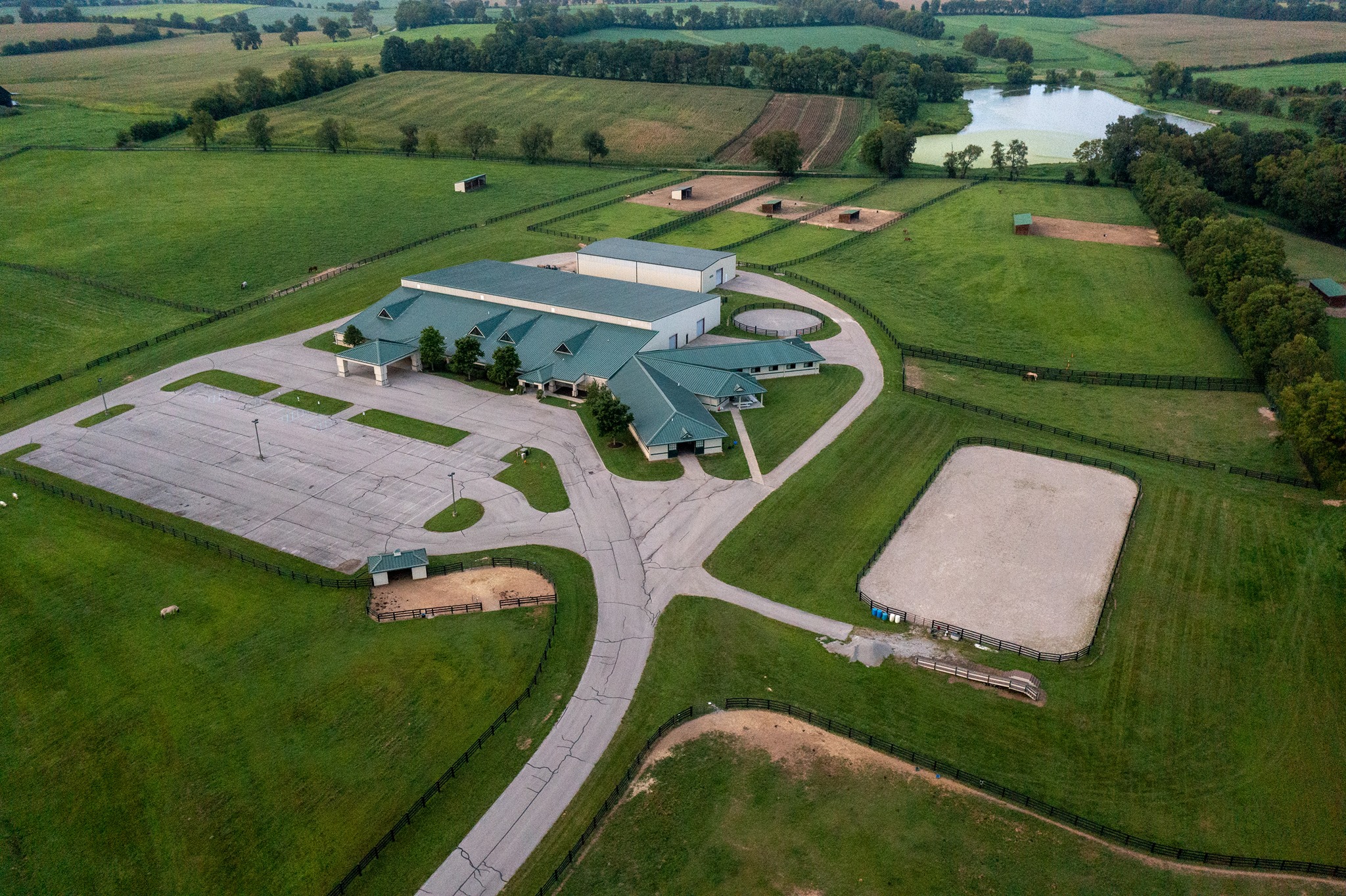
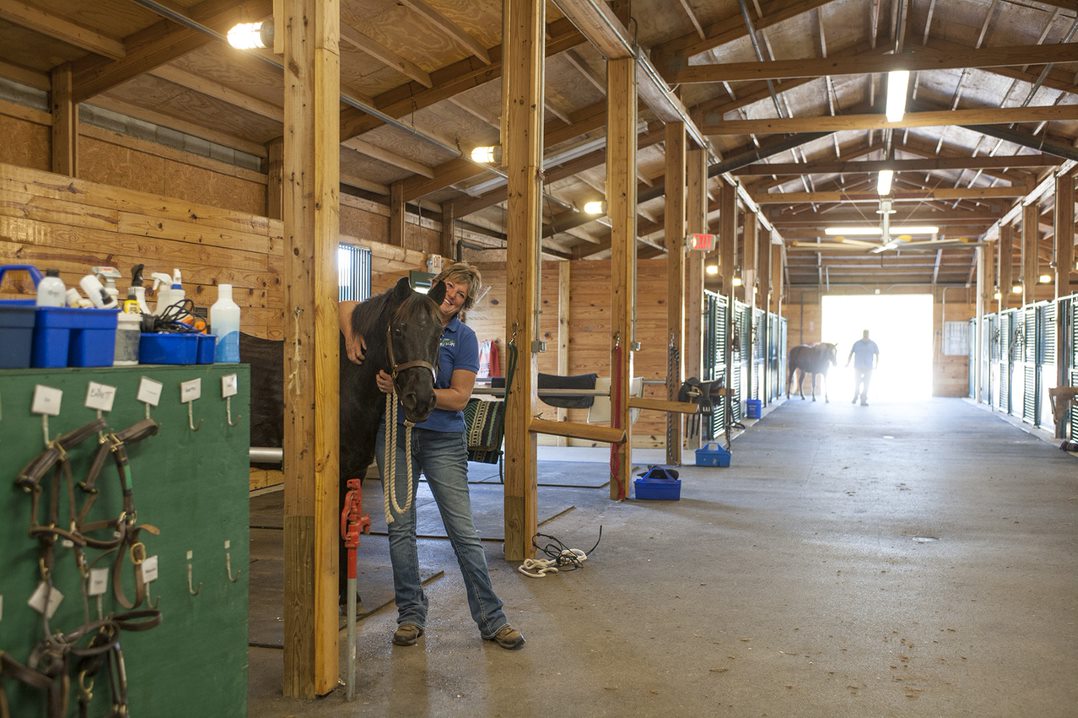
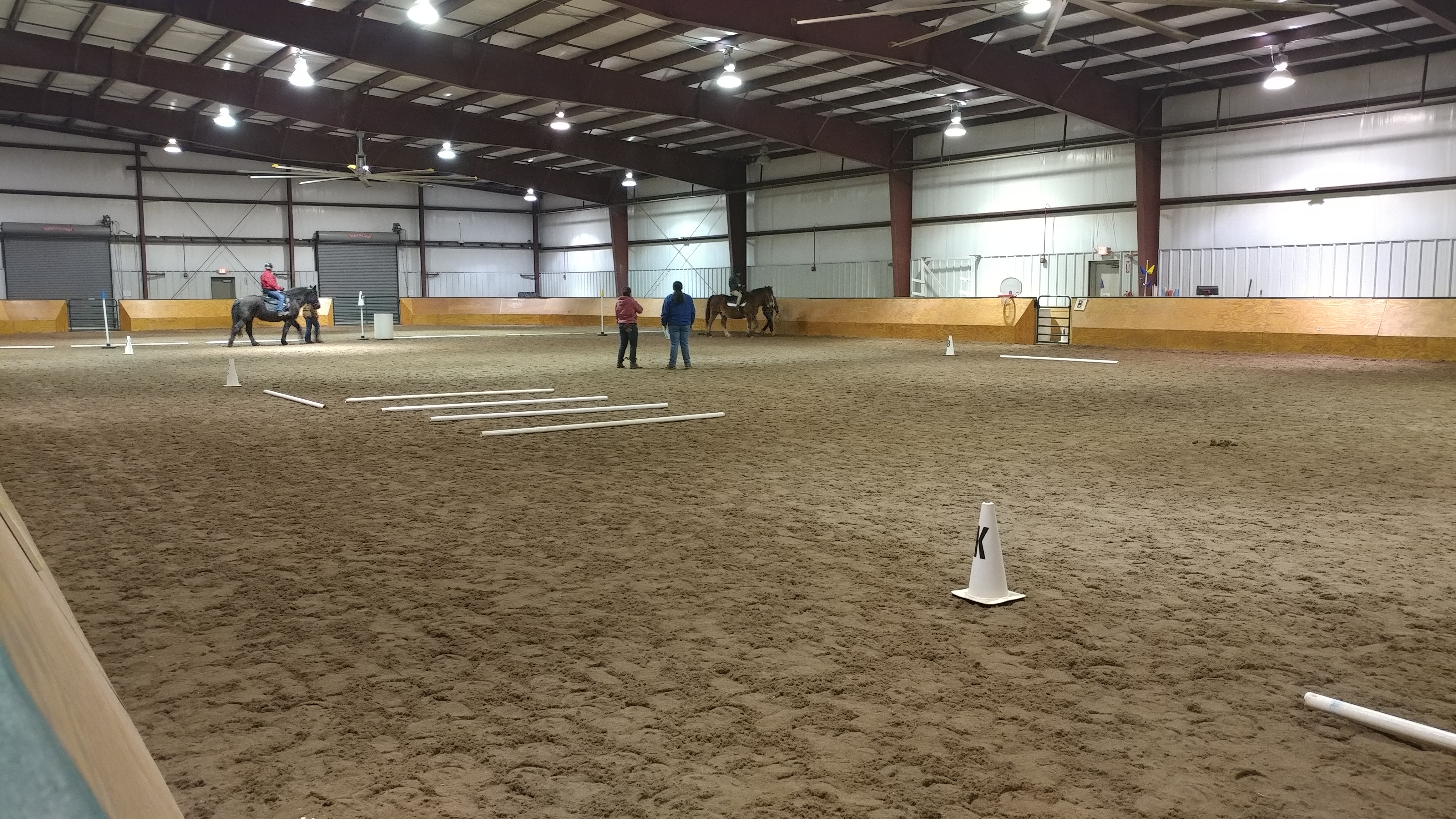
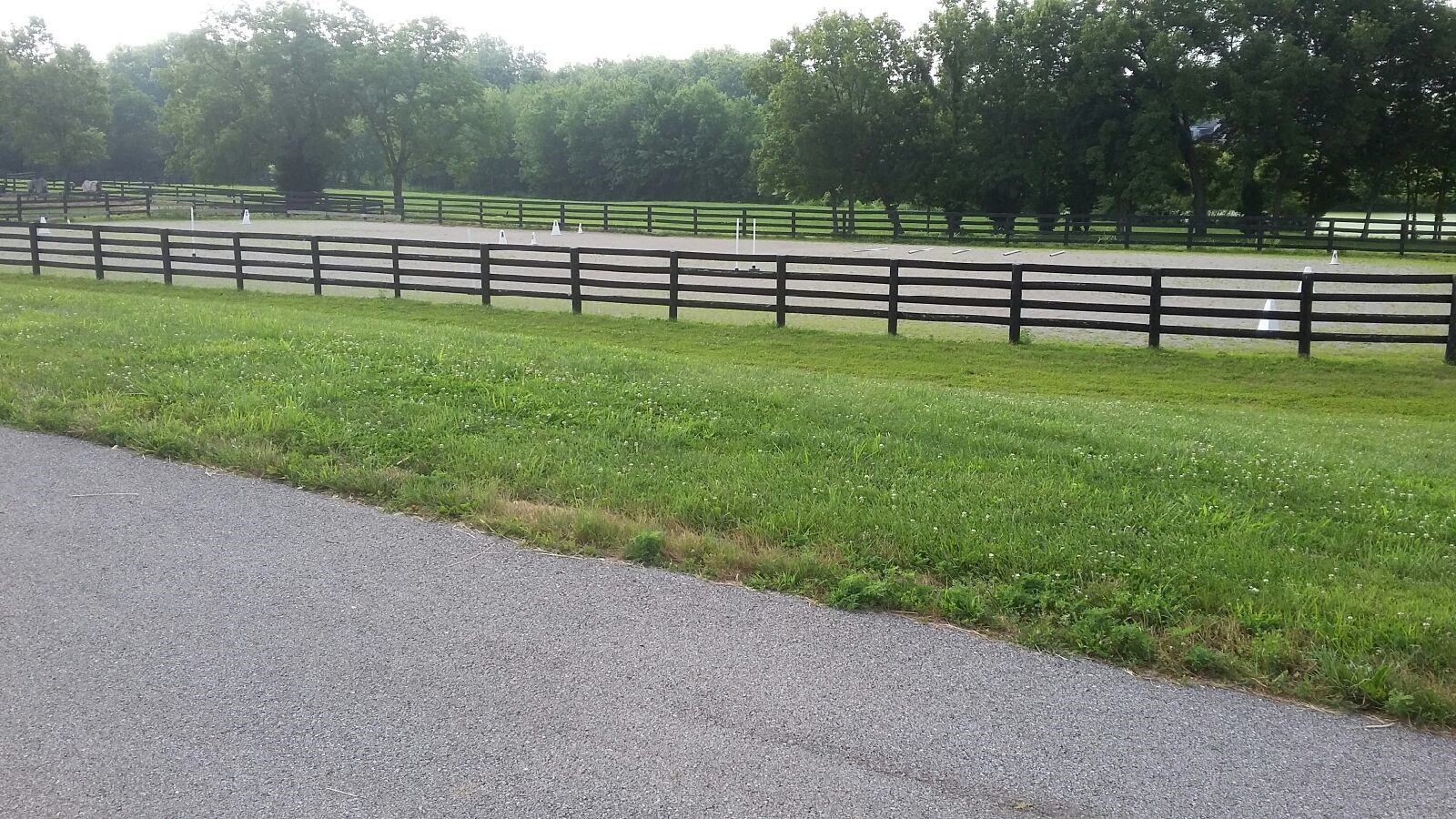
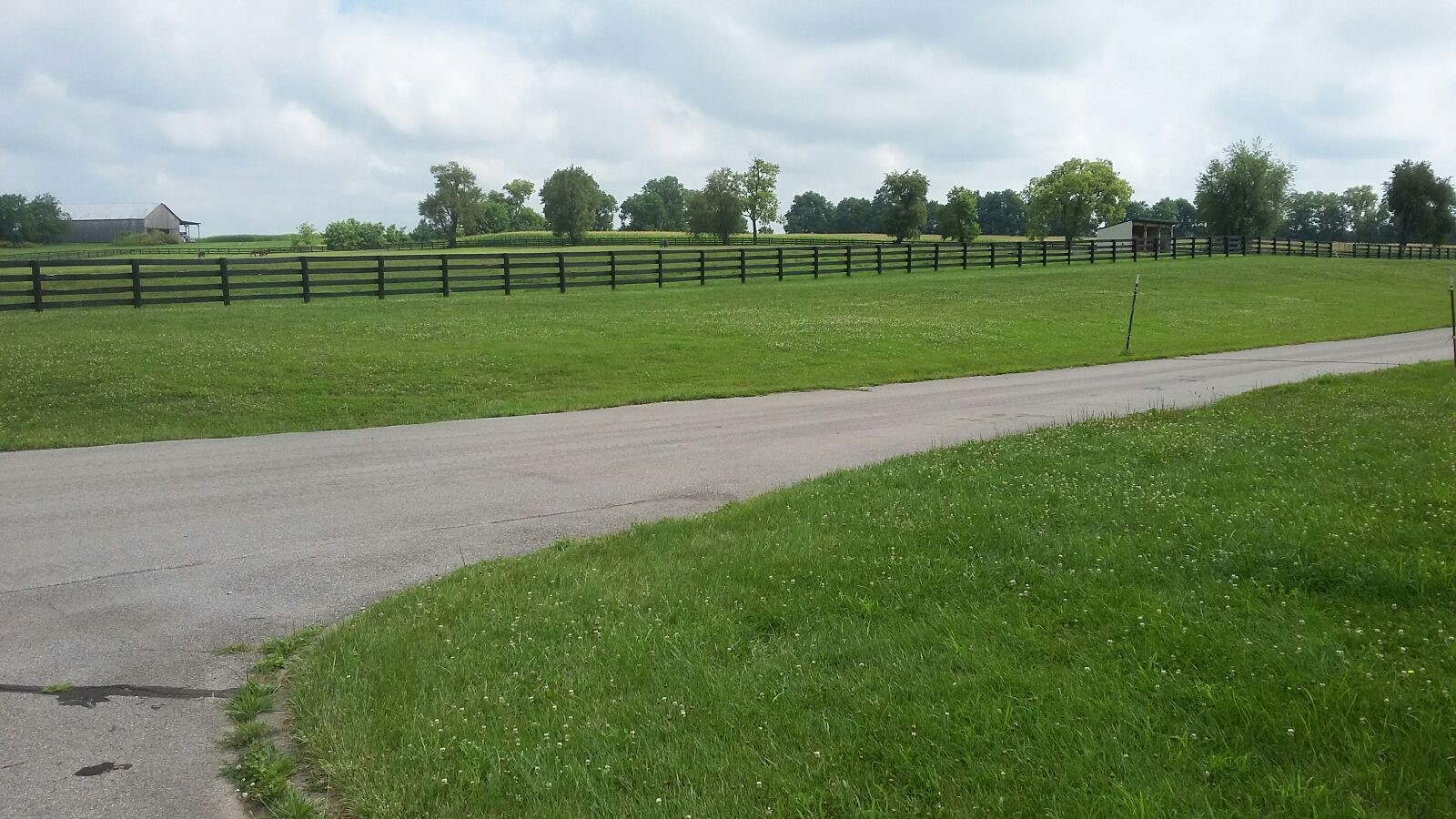
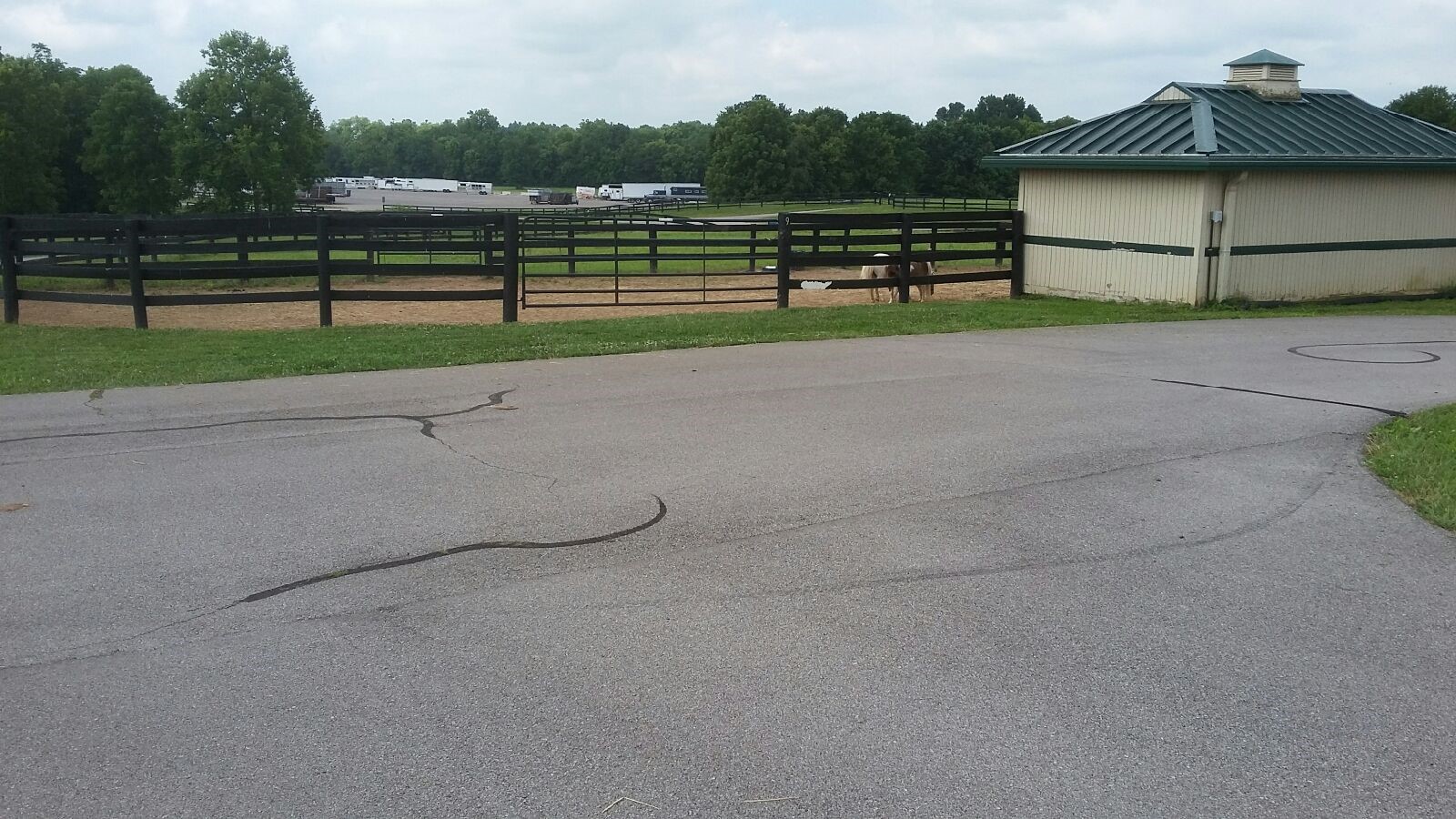


Are the organization's rules, restrictions and warnings (signage) conspicuously posted in easily accessible locations? Yes
Are the organization's emergency contacts, including veterinarian contact information, conspicuously posted in easily accessible locations? Yes
Are human and equine first aid kits easily accessible? Yes
Regarding all shelters where horses are housed including run-in sheds:
Do horses have assigned stalls in the barn/structure(s) or exclusively assigned shelter locations where they are separated from other horses with a barrier? No
How many hours per day, on average, are horses stalled or restricted to these sheltered exclusive shelter locations? 0-3;
How often are the stalls/shelters cleaned, i.e., kept in good repair and free of standing water, accumulated waste, sharp objects and debris? 6-7 Days a Week
Do all stalls/shelters allow horses to lie down, stand up and turn around and provide protection from inclement weather (wind, sleet, rain, snow and extreme temperatures)? Yes
Are stalls/shelters kept in good repair, with adequate ceiling height, and free of standing water, accumulated waste, sharp objects and debris? Yes
Are floors constructed and maintained for both good drainage and traction? Yes
Is there a ventilation and circulation system in place to allow free flow of air to control temperature, and humidity, and to prevent air stagnation? Yes
Is wiring inaccessible to horses and maintained for safety in all areas of facility? Yes
Are fire prevention/protection measures (fire alarms, extinguishers and sprinkler systems) maintained and in good working order? Yes
Is there adequate lighting to ensure safety in all areas of facility? Yes
How many hours per day, on average, are horses turned out:
Equines are out 24/7 except they are brought in to feed
Equines are out 24/7 except they are brought in if there is inclement weather
Equines are out 24/7 except when they are being trained
Equines are out 24/7 except when they are used for the conduct of the organization's programs
The following describes the pastures at this facility:
This facility has a written plan in place for pasture management, which includes guidelines for seeding, fertilizing, irrigation, mowing, dragging, harrowing, manure removal, removal of debris, the control of poisonous plants, and a schedule for cleaning
A dedicated staff person(s) is responsible for pasture management
All pastures are fenced to prevent escape or injury
Electric fencing is used; electric wires or tape fence are visibly marked
Fencing checks, such as broken or missing planks, loose fence posts, exposed or loose nails, detached wires, etc., are done regularly
Pastures are rotated
Pastures have natural protection for equines (i.e., trees)
Pastures have man-made protection for equines (i.e., shelters)
This facility does not have pastures where equines can graze on pasture grass
Barbed wire is used for fencing
The following describes the turnout areas other than pastures at this facility:
This facility has a written plan in place for the maintenance of turnout areas, which includes a schedule for cleaning, manure removal, and dragging
A dedicated staff person(s) is responsible for the maintenance of turnout areas
All turnout areas are fenced to prevent escape or injury
Electric fencing is used; electric wires or tape fence are visibly marked
Turnout areas have man-made protection for equines (i.e., shelters)
Fencing checks, such as broken or missing planks, loose fence posts, exposed or loose nails, detached wires, etc., are done regularly
This facility does not have turnout areas
Barbed wire is used for fencing
The following policies and procedures are in place at the facility to restrict public access and to keep horses safe:
A security guard is present at night
There is a practice in place to monitor equines overnight
No Trespassing signs are posted
Hold Harmless signs are posted
Authorized Personnel Only signs are posted
Visitors are only permitted at specific times
Visitors are only permitted in specific areas
The property is fitted with motion lights
The property is fitted with a security system monitored by police or a professional service
The property owner, staff member or caretaker lives on the premises and ensures that public access is restricted and is responsible for the security of the facility and equines
By Appointment Only signs are posted.
Entrance gates are locked at night
The property is fitted with a security system that is monitored internally by staff (or the property owner)
The perimeter of the property is fully fenced
Equine Care/Emergency Preparedness: Central Kentucky Riding for Hope, Inc. (*Main) 2026 and 2025 This section is required.
Horse Health Care/Barn Management Records: What system is used to collect and store health/horse care records?
Onsite computer with onsite backup storage system
Onsite computer with cloud-based backup storage system
Our organization utilizes a software application to maintain records
Our organization would use free cloud-based barn management software if available
The following items are consistent with our feed management plan and practices:
Equines are provided with individualized feeding plans, including supplements, according to the equine's age, breed/type, condition, size, work level and any health issues, consisting of nutritious food provided in sufficient quantity and access to adequate natural forage, or be fed daily, or as recommended by the organization's veterinarian
Feed plans are determined in consultation with a veterinarian
Supplement plans are determined in consultation with a veterinarian
Equines are fed grain in groups
Staff and/or volunteers are trained in proper feed measurements and protocols and observed periodically to ensure they are feeding correctly
The feed chart is centrally located and updated as needed
The area(s) where hay, feed, grain, and supplements are stored are kept clean, free of debris and chemicals, and protected from weather and other animals in rodent-proof and mold-proof containers and grain bins
Feed, supplements and hay types are clearly labeled
Water sources, i.e., buckets, troughs, automatic waterers, etc. are kept clean, free of contaminants, debris and chemicals, protected from weather and other animals, and be positioned or affixed to minimize spillage.
Medications are kept in a secure area
Equines are fed grain in individual stalls
Is clean, potable water available at all times for all equines? Yes
Hoof Care: How often is hoof care provided for each equine? Every 4-8 weeks and when an issue arises
Dental Care: How often is dental care provided for each equine? Annually and when an issue arises
Horse checks: How often are equines visually and physically checked by personnel at the facility? Every day or 6 days a week
Our organization has the following parasite and fly/insect control protocols in place, including remedies used to control flies and insects:
Our organization follows the parasite control guidelines of our veterinarian, including fecal testing and de-worming
Fly/Insect Control Remedies:
Fly parasites
Fly Traps and Tapes
Premise Sprays/Insecticides
Fly Spray Repellent
Fly Masks
Fly Sheets
Fans
The following represent the biosecurity practices in place at facility:
Our organization follows the biosecurity guidelines of our veterinarian
Sick, affected and/or quarantined equines do not have contact with other equines or other animals
The organization has a written biosecurity plan
Staff are trained in best practices related to biosecurity
Volunteers are trained in best practices related to biosecurity
A specific individual is trained and assigned to care for sick, affected and/or quarantined equines
Sick, affected and/or quarantined equines are cared for last if the caretaker must also care for healthy equines
Restricted access signs are posted at primary points of access to sick, affected and/or quarantined equines
Hand sanitizers are available at all primary points of access to sick, affected and/or quarantined equines
Footbaths are available at all primary points of access to sick, affected and/or quarantined equines
Manure and bedding from sick, affected and/or quarantined equines is removed from the facility - not put in open air piles, and not spread on pastures
Quarantine areas, such as stalls, aisle ways, paddocks, and common areas, are cleaned (and needed, disinfected) after conclusion of the quarantine.
Trailers/vans used by sick, affected and/or quarantined equines are cleaned and disinfected after each use and cleaning takes place away from where equines are sheltered
Equipment used by sick, affected and/or quarantined equines is not shared
Equipment used by sick, affected and/or quarantined equines is cleaned of organic debris and disinfected after each use
Latex gloves, or equivalent gloves, are worn when working with sick, affected and/or quarantined equines
Equines are not quarantined on arrival.
The following represent the manure removal practices in place at facility:
Manure is piled in an area where equines are not located
Manure is hauled, sold or given away
Our organization adheres to the manure management guidelines set by the state, local authorities, and/or our organization's veterinarian
Manure is stored in dumpster(s)
Manure piles are covered
Manure piles are composted or spread on pastures
The following steps are taken to help staff and volunteers readily identify each horse on the property:
Equines are assigned the same exclusive stall/shelter location each day
Name plates are located on the stall/shelter location
Equines wear halters with nametags
A notebook or binder with photos and information on each equine is easily accessible
A map/diagram is posted showing the location of each equine with equine names and photos
Equine photos and profiles are available on the website
Staff and volunteers are provided with an information packet with equine profiles, including photos and detailed descriptions
Staff/volunteers are provided training on conformation, markings, colors, and breeds
Team leaders work with new staff/volunteers until they are able to identify the equines
Photos are located on the stall/shelter location
Our organization has the following policies and procedures in place pertaining to tack, apparel and equipment:
Saddles are shared
Saddle pads are shared
Blankets, sheets and turn out apparel are fitted and utilized for each equine appropriate to the equine's needs and the weather conditions
Blankets, sheets and turn out apparel are cleaned regularly as needed
Riding Tack is always cleaned at least weekly
Riding Tack is inspected for overall working condition before each use by trained personnel
Riding Tack is assessed for fit before each use by trained personnel
Riding Tack is assessed for fit by trained personnel when an equine's body condition changes
Riding Tack is assessed for fit by trained personnel when an equine's disposition changes
This facility enlists the services of a professional saddle fitter at least once a year
Assigned riding tack is clearly labeled
Riding Tack is stored in a climate-controlled location
Helmets are shared
Helmets are cleaned/disinfected after each use
Helmets are replaced after a fall
Helmets are replaced at least every five years.
All equines have specifically assigned apparel, equipment and tack (saddles/bridles if ridden) that is not shared
Bridles are shared
Bits are shared
Blankets are shared
Sheets are shared
Turnout apparel is shared
Halters are shared
Riding Tack is always cleaned after each use
Riding Tack is cleaned only when needed
No equines are ridden; saddles, bridles, etc. not applicable.
Emergency Preparedness: Central Kentucky Riding for Hope, Inc.: *Main This section is required.
The following plans, policies, and procedures are in place at the facility to handle emergencies and address weather related issues, fire safety procedures, and/or any additional hazardous scenarios the facility could potentially experience:
Emergency procedures are posted prominently
The facility owns or has access to a generator
The facility maintains at least two weeks of hay, feed, shavings and medications
The facility collects and maintains medical information from staff, volunteers, and clients
The facility maintains appropriate liability and/or workers' compensation insurance
The organization has a written emergency preparedness/safety plan (EPP)
Local fire department and/or the state's emergency planning department procedures
Medical emergencies for clients, staff, and volunteers
Medical emergencies for equines
Evacuation plans
Power outages
Fire
Natural Disasters - thunderstorm, hurricanes, earthquakes, tornados, etc
Terrorist attacks
Protocols to notify emergency personnel
Building/facility exit plans
The facility follows the specific procedures to help PREVENT emergency situations:
Smoking is strictly prohibited
NO SMOKING signs are posted prominently
Hay is stored away from permanent or temporary structures where equines are stalled
Permanent or temporary structures where equines are stalled are kept free of dust, cobwebs, trash, cleaning rags, and other flammable items
Aisles and doorways are kept clear
Heaters with automatic shutoff settings are used
How often are the following checked or performed?
Fire Extinguishers are checked: Quarterly
Smoke detectors are checked: Quarterly
Fence lines are checked: Daily
Turnout Areas are checked: Daily
Sprinkler systems are checked: Quarterly
Fire drills are conducted: Quarterly
Review of safety protocols with staff are conducted: Semi-annually
Review of safety protocols with volunteers are conducted: Annually
The Emergency Preparedness Plan is reviewed and updated: Annually
Equine Transportation: 7= Onsite: 1 (1 + 0) + Offsite: 6
2-horse van/trailer with truck:
1 Owned onsite 1 Access offsite;
3-horse van/trailer with truck:
1 Access offsite;
4-horse van/trailer with truck:
1 Access offsite;
6-horse van/trailer with truck:
1 Access offsite;
8-horse van/trailer with truck:
1 Access offsite;
10-horse van/trailer with truck:
1 Access offsite;
GOVERNANCE, MANAGEMENT & FINANCIAL REPORTING
Financial ReportingBudget: $500K to $1M
Month Fiscal Year Ends: 12
Type of Financial Reporting (Audit, Review, Compilation): Compilation
Type of IRS Filing (990, 990-EZ, 990-N): 990
Governing Body:
Board meetings per year: 6
Number of Board Members: 20 Number of Voting Board Members: 20
Board Compensation:
Is the Board Chair compensated? No Is the Treasurer compensated? No
Are there any other Voting Board Members that are compensated? No
Board/Staff Relationships:
Are any members of the Board, Staff or Program Participants related to each other through family or business relationships? Yes
If yes, provide the name, title, responsibility and family/business relationship of each Board, Staff member and/or Program Participant.
Two (2) Board members Martha Jane Mulholland & John Henry Mulholland are mother & son and partners in their business venture Mulholland Springs Farm.
Board/Staff Affiliations:
Are any Board members providing services to your organization or compensated by your organization, or are any Board members or staff members associated with and/or compensated by another organization with a relationship or business affiliation to your organization? Yes
If yes, provide the name, title, responsibility and family/business relationship of each Board and/or Staff member, and the name of the related organization.
Two veterinarians from the clinic providing veterinary services are Board members.
Conflict of Interest:
Does your organization have a written conflict of interest policy that ensures that any compensated board member is a NON-VOTING (Independent) board member or that any compensated board member or any board member related to a compensated staff member, independent contractor, or any related board members, or any individual or organization that might benefit from a board decision, abstains from voting on issues impacting such compensation and requires officers, directors or trustees, and key employees to disclose at least annually in writing interests that could give rise to conflicts? Yes
Compliance:
Below is a list all local, state and federal licenses held by the organization, and/or accreditations or compliances with the published standards of an accrediting organization, if applicable: CKRH is a Premier Accredited Center of the Professional Association of Therapeutic Horsemanship Int'l (PATH) and has maintained this status since 1998.
Organization documents available on our website:
Most recent Annual Report
Equine Intake Guidelines
Organization documents available on request:
Most recent Financials
Most recent IRS Form 990
Most recent Annual Report
Equine Intake Guidelines
Volunteer Handbook
Staff Handbook
Bylaws
Staff & Volunteers:
Chief Staff Officer (CSO): Ms. Pat Kline, Executive Director
Employees/Independent Contractors: Full-Time: 8 Part-Time: 9 Volunteers: 125
Staff Recruitment, Screening and Training processes including employees and independent contractors:
Prospective staff/independent contractors complete a written application/agreement
Our organization has a practice in place to ensure that the organization has sufficient knowledge of the background of prospective staff and independent contractors that may impact the safety of your clients and your horses, such as whether prospective staff/independent contractors serving in the capacity as staff have been convicted of a sexual offense or convicted for animal cruelty or neglect. Such practices must comply with local, state, and federal mandates.
Staff and/or contractors are required to complete a Liability Release/Hold Harmless Agreement
Staff and/or contractors are required to provide Emergency Medical Information
Staff and/or contractors are required to sign a Photo Release
Prospective staff/independent contractors are required to undergo a Background Check
Staff and/or contractors provide parent/guardian information if applicable
Staff and/or contractors carry current health insurance
Staff and/or contractors have a written job description
Staff and/or contractors are evaluated on an annual and as needed basis or with any change in their job description
Staff and/or contractors are updated on all the organization's policies and procedures on an annual and as needed basis or with any change in policy or procedure
Staff and/or contractors receive training that includes safety guidelines, confidentiality, equine handling, equine identification, and emergency procedures; additional training is job specific
Staff and/or contractors have a supervisor and is responsible for keeping their supervisor up to date on work related activities
The organization provides a handbook ((available either online or in print) to every member of the staff, including employees and/or independent contractors serving in staff positions;
The handbook includes information, such as hours of work, vacation, sick leave, dress code, cell phone usage, and the protocol for dismissal
The handbook is reviewed annually and updated
One or more staff members or contractors are trained in CPR and human first aid
One or more staff members or contractors are trained in equine first aid
Staff and/or contractors are subject to Random Drug Screening
Volunteer Recruitment, Screening and Training processes:
Prospective volunteers complete a written application/agreement
Our organization has a practice in place to ensure that the organization has sufficient knowledge of the background of prospective volunteers that may impact the safety of your clients and your horses, such as whether prospective volunteers have been convicted of a sexual offense or convicted for animal cruelty or neglect. Such practices must comply with local, state, and federal mandates.
Volunteers required to complete a Liability Release/Hold Harmless Agreement
Volunteers are required to provide Emergency Medical Information
Volunteers are required to sign a Photo Release
Prospective volunteers are required to undergo a Background Check
Volunteers provide parent/guardian information if applicable
Volunteers carry current health insurance
Volunteers have written job descriptions
Volunteers are evaluated on an annual and as needed basis or with any change in their job description
Volunteers are updated on all the organization's policies and procedures on an annual and as needed basis or with any change in policy or procedure
Volunteers receive training that includes safety guidelines, confidentiality, equine handling, equine identification, and emergency procedures; additional training is job specific
Volunteers are assigned a supervisor (staff member and/or senior volunteer) and is responsible for keeping their supervisor up to date on work related activities
The supervisor assesses the volunteer's abilities and assigns specific duties to the volunteer based on their skills
The organization records and maintains written attendance information and hours on every volunteer
The organization provides a Volunteer Handbook to every volunteer
The Volunteer Handbook (available either online or in print) includes volunteer-related information, such as hours of work, dress code, cell phone usage, and the protocol for dismissal
The Volunteer Handbook is reviewed annually and updated
The organization holds regular orientation sessions for volunteers and prospective volunteers that includes an overview of the organization, its mission, activities, volunteer responsibilities and expectations, safety guidelines, and a tour of the facility
Volunteers are subject to Random Drug Screening
© Copyright 2018 EQUUS Foundation 297 5.00
